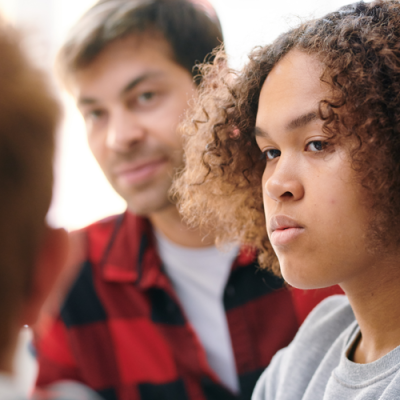Refine results
-
Rights and Freedoms30 March 2019Speech
‘Free and Equal’: Making Human Rights Education a Priority
National FutureSchools Expo and Conferences 21 March 2019, Melbourne Introduction I pay my respects to the Wurudjeri peoples of the Kulin nation who are the traditional custodians of this land—to their elders, past and present, and to the future generations, the children and young people that look to us as educators. I also extend this respect to all Aboriginal and Torres Strait Islander -
14 April 2022Conciliation register
2021-02-13
The complainant is Sikh and Punjabi and wears a turban over his unshorn hair. He alleged the respondent university required him to wear the graduation trencher hat in order to participate in his graduation ceremony. The complainant said he could not fit the trencher over his turban and could not remove the turban for religious and practical reasons. He alleged university staff were rude and … -
Disability Rights15 April 2024Webpage

Ambassador Profile - Lisa Stafford
Lisa shares some of her achievements, projects she’s working on, the value of lived experience and tips for employers and people with disability. -
26 March 2014Book page
Chapter 4: Principle 1: Strong leadership drives reform
Key findings of ADF Review To support and drive the cultural reform envisaged by the ADF Review, strong, clear and consistent leadership is essential. This commitment must be widely communicated and reinforced at all levels of the organisation through policies, practices, rewards and sanctions. Progress must be monitored at the most senior levels regularly and transparently. Every member of… -
Children's Rights19 May 2023Project

Supporting Quality Engagement with Children
Project overview The Supporting Quality Engagement with Children consultation project aims to include the voices of children, young people and their families in policies and services that directly affect them. The five Key National Strategies The National Children’s Commissioner, Anne Hollonds is undertaking consultation activities across five Key National Strategies. Safe and Supported:… -
Commission – General14 December 2012Speech
Site navigation
I have been asked to speak today about the contributions made to Australia by women from diverse cultures. A topic difficult for its breadth, depth and complexity - like our cultures and identities themselves. Made more difficult by the variety of women's experiences and the way we choose to define 'contribution.' -
Aboriginal and Torres Strait Islander Social Justice10 May 2023Media Release
First Nations women respond to Banksia Hill riots with call for immediate reform to youth justice
First Nations female leaders from across Australia are demanding immediate reform to Western Australia’s approach to youth justice in the wake of today’s riots at the Banksia Hill Juvenile Detention Centre. Hundreds of First Nations women are attending the Wiyi Yani U Thangani National Summit in Canberra this week, including Commissioner for Children and Young People WA Jacqueline McGowan… -
14 December 2012Book page
Commission Website: National Inquiry into Children in Immigration Detention
We must face up to our humanitarian responsibilities to accept refugee children and their families. We must take them out of the immigration detention centres and welcome them into the community where they can play, learn and grow. At least then when our children look back on this time and ask us what we did to stand up for refugee kids, we can say we gave them their childhood." (Calvert,… -
Business and Human Rights22 December 2021Media Release
Australian and New Zealand Human Rights Commissions and FIFA publish Human Rights Risk Assessment ahead of the FIFA Women’s World Cup 2023™
The Australian Human Rights Commission, the New Zealand Human Rights Commission along with FIFA have today published a Human Rights Risk Assessment for the next FIFA Women's World Cup, to be held in Australia and Aotearoa New Zealand in 2023. The assessment examined the potential human rights impact of the FIFA Women’s World Cup 2023™ on players, spectators, workers and local communities in … -
Legal14 December 2012Webpage
Crimes Amendment (Bail and Sentencing) Bill 2006
1. The Human Rights and Equal Opportunity Commission (‘the Commission’) provides this submission to the Senate Legal and Constitutional Affairs Committee (‘the Committee’) in its inquiry into the Crimes Amendment (Bail and Sentencing) Bill 2006 (‘the Bill’). -
14 December 2012Book page
Native Title Report 2008 - Chapter 7
Over the millennia, Indigenous peoples have developed a close and unique connection with the lands and environments in which they live. They have established distinct systems of knowledge, innovation and practices relating to the uses and management of biological diversity on these lands and environments. -
Children's Rights17 January 2019Speech
Megan Mitchell at the National Press Club
I would like to acknowledge the Traditional Owners of the land we gather on today, and across Australia, and pay my respects to Elders past, present and future. Thanks to UNICEF for the opportunity to share the moment in which both our reports are submitted, and Anne Sherry in particular. Congratulations also to UNICEF and the Child Rights Taskforce on this fabulous report. When Australia… -
14 December 2012Book page
Annual Report 2008-2009: Chapter 9
This report covers my final year as the Race Discrimination Commissioner, a position I have occupied for five years alongside my position as the Aboriginal and Torres Strait Islander Social Justice Commissioner. -
Aboriginal and Torres Strait Islander Social Justice28 November 2022Media Release
New report sets the stage for First Nations women to lead response to family and community violence
The report is an outcome of the recent Wiyi Yani U Thangani First Nations Women's Safety Policy Forum which was held virtually in September and which brought together over 150 participants from all around the country, the majority being First Nations women. -
29 January 2013Book page
Executive Summary
This Report presents the findings of Phase One of the Review into the Treatment of Women at ADFA and in the ADF. Phase One of the Review focuses specifically on ADFA. This report contains four chapters and 31 recommendations. These recommendations build on reform processes begun in the late 1990s and identify further, significant areas for change. A description of ADFA, including its history… -
14 December 2012Book page
Native Title Report 2000: Appendix 5
The following instruments, declarations, principles and guidelines set out Australia's International human rights obligations with regard to cultural heritage protection. -
Aboriginal and Torres Strait Islander Social Justice1 June 2021Speech
AIATSIS Summit Keynote Address: Truth for change—Reckoning with our past and transforming our nation
Introduction and acknowledgements Opening in Bunuba. Good morning everyone. I acknowledge the Kaurna peoples whose lands we gather on for this conference—I pay my respects to your elders, past, present and emerging. I also acknowledge all our peoples who have come from countries—First Nations—from across this vast continent, carrying many diverse and interconnected languages, cultural… -
Legal7 June 2017Submission
Submission: Inquiry into Strengthening Multiculturalism (2017)
Australian Human Rights Commission Submission to the Select Committee on Strengthening Multiculturalism -
29 January 2013Book page
Bibliography
Acting Commonwealth and Defence Force Ombudsman, Australian Defence Force: Management of Complaints about Unacceptable Behaviour,Report No 04 (2007). Army JROTC Cadet Reference, Leadership Education & Training, 2 nd ed. Headquarters Army Command. At www.dimondjrotc.org/cadet_reference.pdf(viewed 23 June 2011). Australian Army, ADFA Army Single Service Training. At http://www.army.gov.au… -
Legal14 December 2012Webpage
The protection of genetic information of Indigenous peoples
This submission is made by the Aboriginal and Torres Strait Islander Social Justice Commissioner of the Human Rights and Equal Opportunity Commission. It considers the human rights implications of the use of the genetic information of Aborigines and Torres Strait Islanders (herein, Indigenous peoples) and the adequacy of current levels of protection.
